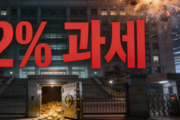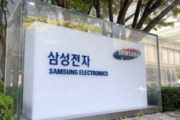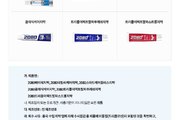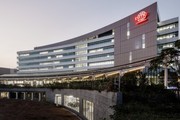
[News Space=Reporter seungwon lee] The controversy surrounding Hanwha Group's management succession and large-scale paid-in capital increase was highlighted in the National Assembly.
At the discussion session titled “Is the current Hanwha management succession okay?” held at the 10th conference room of the National Assembly Members’ Hall at 2:00 PM on the 14th, criticism poured in that the recent actions of Hanwha Group, such as the paid-in capital increase of Hanwha Aerospace (hereinafter referred to as Hanwha Aero) and stock transactions between affiliates, were typical examples of the backward management structure of a large conglomerate and of irregular and unlawful succession.
This discussion was co-hosted by about 20 members of the National Assembly, including Kim Sung-hwan, Park Ju-min, Yoo Dong-soo, Kim Seung-won, Min Byeong-deok, Park Sang-hyeok, Oh Ki-hyung, Lee So-young, and Lee Jeong-moon, as well as the Economic Reform Solidarity and People’s Solidarity for Participatory Democracy. The discussion was organized to seek ways to improve the governance structure of large conglomerates, including revising the Commercial Act and the Capital Market Act, focusing on the issue of Hanwha Group’s management succession.
◆ Hanwha Group's Behavior is the Basis of Market Distrust: 'Disregarding Shareholders' and 'Illegal Succession'
Lee Chang-min, a professor at Hanyang University’s business school, said in his keynote speech, “Hanwha’s large-scale paid-in capital increase and stock trading between affiliates are an expression of market discontent,” and “It is reasonable to suspect that the largest paid-in capital increase in the history of the domestic stock market was carried out unfriendly to shareholders and for the benefit of the group’s family.”
The professor said, “It is difficult to agree with Hanwha’s position that the chairman’s family’s participation in the paid-in capital increase without a discount was a ‘sacrifice by major shareholders,’” and emphasized, “The market’s suspicion that Hanwha Energy, 100% owned by Chairman Kim Seung-yeon’s three sons, concentrated on increasing its stake in Hanwha Corporation in the second half of last year in preparation for the succession of management rights is entirely reasonable.”
He argued that “such a large-scale paid-in capital increase is itself a serious governance issue,” and that “just changing the wording of the Commercial Act is not enough, and a comprehensive control tower that comprehensively addresses the governance issues of conglomerates is needed.” He also added that “economic growth must be achieved through securing fairness in the capital market, value-up, appropriate allocation of capital, and increased productivity.”
◆ “Hanwha, a typical example of backward governance structure… Urgent need to regulate capital transactions of affiliates”
Professor Choi Han-soo of the Department of Economics and Trade at Kyungpook National University criticized the Hanwha Group, saying, “Hanwha Group is a typical conglomerate with a backward control and ownership structure,” and “they have increased the wealth of the controlling shareholder’s family through unrelated diversification, corporate acquisitions using funds from affiliates, job hoarding, and misappropriation of corporate opportunities.”
He said, “Korea has virtually no regulations on capital transactions between affiliates,” and proposed that “capital investment within conglomerates to prevent dilution of the controlling interest causes national economic inefficiency, so investment between affiliates should be regulated.”
◆ “Hanwha Energy secures ‘seed money for succession’…mobilizes all illegal and unlawful succession methods”
Kwak Jeong-su, a senior reporter at the Hankyoreh Economic and Social Research Institute, said, “Hanwha Energy’s rapid increase in its stake in Hanwha Corporation, the group’s holding company, was intended to secure ‘seed money for succession’ for Hanwha Energy,” and pointed out, “The reality of our capital market is that Vice Chairman Kim Dong-kwan is playing four roles: group successor, largest shareholder of Hanwha Energy, CEO of Hanwha Aerospace, and registered director of Hanwha Ocean.”
Reporter Kwak criticized, “The fact that Hanwha S&C, which was spun off from Hanwha Corporation in 2001, has become Hanwha Energy, the largest shareholder of Hanwha Corporation, in 24 years is the result of the conglomerate mobilizing all of its illegal and expedient succession methods,” and “This large-scale paid-in capital increase has confirmed that the conglomerate group’s autonomous protection of shareholder interests and improvement of governance structure are empty dreams.”
◆ “Chaebol System Turns Our Society into a Feudal System… Bold Regulations Are Needed”
Attorney Kim Jong-bo (Director of the Economic and Financial Center of People’s Solidarity for Participatory Democracy) explained, “Hanwha Energy purchased Hanwha Aerospace stocks with the 1.3 trillion won it earned from selling Hanwha Ocean stocks, and if Hanwha Aerospace grows, the value of the shares held by Hanwha Energy will increase,” adding, “This is a repetition of the succession process centered around Samsung Group’s Everland in the past.” He emphasized, “Innovation and investment are possible only when the chaebol system and monopolies are boldly regulated.”
◆ “Urgent need to improve laws and systems to protect shareholders”
The attendees pointed out that “Hanwha has invited a stock price decline and controversy over succession by increasing capital without revealing a specific investment plan,” and that “it has revealed that the company does not consider shareholder interests in important decision-making.” They unanimously agreed that “there is an urgent need for institutional improvements, such as revisions to the Commercial Act and Capital Market Act to protect shareholders, including the expansion of directors’ duty of loyalty.”











































